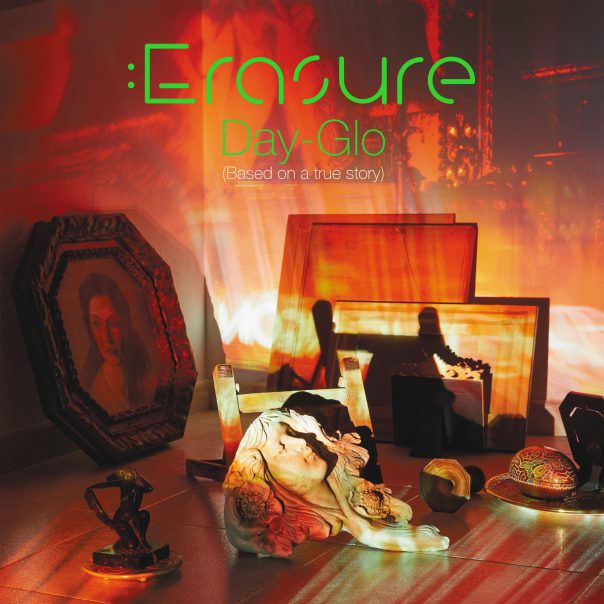ALBUM REVIEW: Erasure goes post-apocalyptic disco on ‘Day-Glo (Based on a True Story)’

Erasure, “Day-Glo (Based on a True Story).”
Since 1985, Erasure has churned out pop hits that have been no less subtle (or less fun) than a queer revival. They’re kind of like an Erasure live show, with background singers in rainbow-colored lamé suits and an equally colorful Andy Bell, belting out-and-proud synth-filled dance floor bangers. With Bell on vocals and Vince Clarke (of Depeche Mode and Yaz) on keyboard, the band has turned up the party for decades running. Two years and one socially isolating pandemic later, Day-Glo (Based on a True Story) is, well, not that kind of album.
Day-Glo (Based on a True Story)
Erasure
Mute, Aug. 12
6/10
Bell’s voice is still as soaring as ever. A synthesizer with a heart, it’s plaintive in mourning or even in joy (reminiscent of ’80s cohort Alison Moyet). But you won’t hear much of it on this album. And when you do, it’s layered under Clarke’s sound effects. AutoTuned eeriness, ominous keyboards, deconstructed beats and lonely syncopations—after the past couple of years, who wouldn’t be feeling that post-apocalyptic disco vibe?
Like most of us, Clarke found himself during the pandemic with “unscheduled time,” spending it alone in the studio. He took to noodling around with tracks from The Neon, until the foundation for Day-Glo was laid. Bell and collaborator Gareth Jones took those tracks and added the vocal collages that ended up on the completed album.
You wouldn’t recognize much of the sound from The Neon on Day-Glo, however. Far from queer disco anthems, they’re moody ‘90s B-side remixes, murky Brian Eno tracks or downtempo Saint Etienne non-singles. It’s not a turn-off, but it’s definitely a vibe. And that vibe is more along the lines of, Shit, what just happened to the world?
Album opener “Based on a True Story” sets a “Blade-Runner”-esque, orange-hued atmosphere for the album. Sparsely filled with ’80s retro keyboard and Bell’s barely perceptible vocals echoing in the background, it feeds quietly and abruptly into “Bop Beat,” which speeds up the tempo and drops in ‘90s percussive dance beats. But the mood still evokes a spare, tinted landscape.
By the time “Pin-Prick” drops in, you start to feel the same claustrophobia that Clarke must have felt in that studio by himself—haunted beats trying to make a song but instead settling into a soundscape. The somber sound fades over from one track to the next, carrying the last song’s darkness with it. Listen to “The Con Man” and you can picture something like what the the last one our on the dance floor must feel like, dragging streamers through dirty, empty corridors, an occasional voice barely floating through the speakers, asking, “What are we gonna do about it?”
You can sense a few bodies returning to the dance floor midway through the album. Things perk up for songs like “Inside Out,” with Bell intoning “around and around and around” through some darkened ‘90s disco vibes. Bell’s vocals seem to get barely but perceptibly louder and longer with “Harbour of My Heart.” But the beats drop back and the keyboards come to the foreground again by the last track, fittingly titled “The End.”
I get it. The pandemic hit our disco-loving hearts where they hurt. This album evokes that. You’ll find yourself missing those well-worn Erasure anthems on this album. But you also might crank this up at the end of the night, saving those older hits for the party to come and this album for the quiet beat of your heart, after everything dies down for the night.
